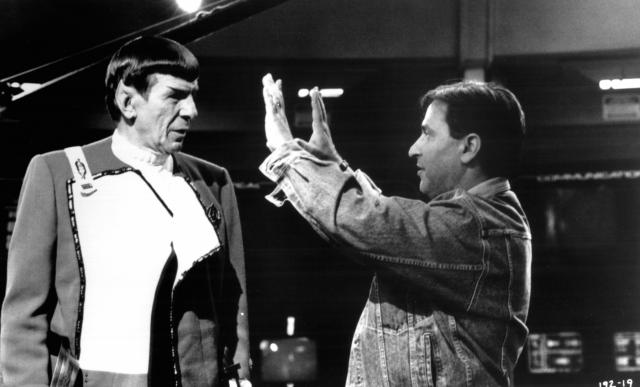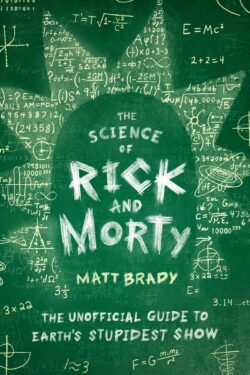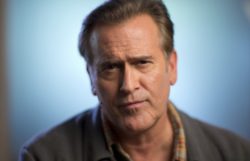Naomi Novik has in the past several years taken her readers literally across the globe in her best-selling Temeraire novels. Beginning with the first, His Majesty’s Dragon, the fantasy series is set during the Napoleonic Wars in an alternate history where talking dragons comprise a valuable aerial force for their respective nations. More specifically they follow the adventures of William Laurence, a British naval captain whose capture of an enemy ship bearing a rare dragon’s egg leads him to a new life as an aviator with this hatchling he names Temeraire. Novik’s dragon is intelligent, witty, intensely loyal to his human captain and often defiant of the society of his time. And he is just one of many in a hugely diverse cast of humans and dragons. Such vivid characters thrown into Novik’s rich reworking of actual history really make this a standout story.
The books are scheduled to wrap up with its ninth installment, League of Dragons, hopefully sometime next year while director Peter Jackson currently holds the screen rights to the series (More on that below). With all of the above going for it, and the fact that it’s a personal favorite book series of mine, I was so excited to get to speak with Naomi at New York Comic Con while she signed books for her fans.
Lauren Damon: When planning the novels, because they’re centered around the Napoleonic Wars, do you have an outline of what history is going on or do you start with your plot?
Naomi Novik: Oh I definitely check the history first and sort of look into the details. I have a general sense of where the plot is going because I know where the Napoleonic Wars go and I know how I modify the Napoleonic Wars so in that sense I know before I go in. But in terms of figuring out how the details of my plot are going to dovetail the details of history, it’s sort of like a back and forth. I generally get the broad strokes of the historical events first, make sure my plot works with that and then as I write, I generally check on the more specific details to make sure that I’m not contradicting something.
LD: Have you ever hit a snag because history went a different way than your plot?
Novik: You know I’m sure that happens on a routine basis and I just don’t remember all of them…I can’t think of a specific historical event example, but what I can remember is one time I was writing a scene set in Istanbul describing a place and it turned out that that place just didn’t kind of exist. But while reading about that I discovered about a location called the cistern—which was sort of this underwater cistern of the Byzantine era that used to store water for the city and then later on was abandoned and people would still be able to reach it through the basements of their homes. And would occasionally throw things down there. Sometimes bodies disappeared down there and I thought, that’s fantastic! So I put it in. So it actually worked out for the best.
LD: When it comes to the battles sequences, which read as hugely cinematic, how do you plan out just the logistics of those?
Novik: The battles are almost always heavily influenced by actual Napoleonic battles. I mean it depends. The actual battles that take place in the course of a military campaign, then the individual scenes that are about sort of—you know there’s the battles in a war and there are fights that are sort of an adventure sequence, right? And those are more just out of my imagination and the battle scenes are—I have a wonderful book called The Military Atlas of the Napoleonic Wars which basically shows…you can watch the movement of all the companies. It breaks up battles over several days. So you see here’s how they were, sort of setting themselves up, here’s where they were this day, here’s the terrain they were moving on, here are the ways that this person didn’t know what this person was doing and they misunderstood one another. And they got bad information from their spies. And all sorts of details like that which I tend to use as kind of, not exact—because of course my battles are quite different—
LD: They add the aerial level.
Novik: Yes, exactly, because there’s a third dimension going on which changes the tactics and also just the historical locations but yeah, I mean I try to keep that same scope. That scale.
LD: When it comes to certain characters, fans love to pick up on certain expressions or character tropes that repeatedly pop up in your stories—Like Laurence’s concern for his neckcloth or Iskierka [a truly fiery fire-breathing dragon] saying “See if I don’t!”—When you become aware of fans grabbing onto these things, or sort of catchphrases, do you get self conscious about it?
Novik: No, not really. You know, I feel like that’s part of the—In a way I feel like finding those things is part of the pleasure as a fan. I like it myself as a reader. I like recognizing a character’s vocal tics, the character’s all definitely have their own, quite distinct voice in my pen. And I feel like if I tried to…if I became self-conscious and tried to muck with that in a way, I’d probably lose my own internal sense.
LD: Are there certain characters that you really enjoy writing their voice, their dialogue?
Novik: Yeah, I mean Temeraire, obviously. Temeraire is just always fun. Iskierka is always fun. I love writing the dragons voices. I feel like the dragons voices are always really cool. And there’s that pleasure of writing a voice that’s not quite human so I really like to do that.
LD: I love how you even include sexuality into the discussions that the dragons and the humans have because I feel like you don’t often see that associated with the fantasy genre:
Novik: I do feel you know it’s an interesting thing, that in that period there was simultaneously more prudery in a certain sense. Like you didn’t talk about certain things. But at the same time you lived with it a lot more. You lived with death a lot more. And in a way, living with death, I mean you lived in much closer quarters—especially on ships and you sort of had to pretend it wasn’t there. But it really was. And I mean, with dragons especially, I feel like dragons don’t have shame in the same was that human beings have shame. You know, they don’t cover themselves for warmth, so they don’t have any of that body stuff going on. So Temeraire just kind of doesn’t get what’s going on a lot of the time. So his perception is very fun. But I feel like it’s very much that that’s a thing that happens that’s part of life and I don’t know…I feel like I don’t want to pretend that’s not there.
LD: Iskierka in particular in regards to her Captain, Granby’s homosexuality is just kind of like ‘Yeah, of course that’s how he is!’
Novik: I mean to a dragon it’s like what’s the difference between these two—it’s like two action figures, you know?
LD: Or dress up dolls? [Note: The dragon’s frequently make fashion decisions for their humans.]
Novik: Yes, exactly, that’s from Iskierka’s point of view absolutely!
LD: Peter Jackson holds the filming rights to these books—what’s happening there?!
Novik: Basically what happened was you know, after Guillermo Del Toro dropped out of The Hobbit and [Jackson] took over, that essentially put a stop to all his other projects. He’s finishing up the last Hobbit now, and I know he’s going to take a well deserved break and then we’ll see, you know?
LD: Did you see the giant Smaug up on the floor and think eventually?
Novik: I hope so. I hope so. I mean it’s amazing.
LD: Now you wrote the first one in 2006?
Novik: I wrote the first one in 2004 and then they didn’t publish it until 2006 because they asked me to write two more so they could bring them all out one month after another. So I wrote the first three in like 2004-2005, so it’s been about ten years writing it.
LD: So back when you were writing it, or at any point since, have you ever head-cast actors you’d like to see in any of the parts?
Novik: No, no…I don’t. Although I will say I thought at one point—I actually think Tom Hiddleston could make a great Laurence.
[Note: At which point I showed Naomi my Loki iPhone case as a sign of support.]
Excellent! I mean I say that like I’m a huge Tom Hiddleston fan, I mean I love Loki he’s such a fantastic character, I love him…But there are many actors of whom I’m a huge fan who I would say would not make a good Laurence. But I think he actually would.
Famously fan-friendly, Naomi is a co-founder of the Organization for Transformative Works, “a nonprofit dedicated to protecting the fair-use rights of fan creators” and has written her own fan fiction.
LD: Being here at NYCC and just kind of in general are you happy to see that fan fiction is something you hear more about in public discussion, do you think it’s coming sort of out of just something you see online?
Novik: I hope so. You know, in fact we had this panel about fairy tales and of course 95% of fairy tales and fairy tale retellings are fan fiction. It’s the same impulse as fan fiction. It’s using characters that other people recognize to tell your own stories in a way that allows you to communicate and form a community around fiction. So there’s nothing actually new about the fan fiction impulse, it’s just that we’re doing it about media of a different form, right? Which is quite interesting.
LD: Speaking of fan communities–you just opened your own fan forum, is that a convenient way to consolidate your fans?
Novik: It’s not even that, it’s more that you know there are a lot of fans who don’t feel like they know where to find the place to talk. And I love giving them a place to talk now. And a lot of people said that they wanted one, so we went ahead and put it together. But I love–one of the things that I love about the fannish community in general is that it’s so widespread. There’s so many different places and proliferating conversations and I love that. It’s not like, I would never want everybody to come to feel like that they had to come to my site. It’s more like here’s another place to talk if you want to hang out and talk about Temeraire.
LD: Do you have a memorable first fan encounter, or when you became aware or your series having fans?
Novik: I fortunately, the year the Temeraire books came out, I went to like seven conventions that year. And I went to a lot of smaller science fiction conventions first which was a good kind of ramp up. And I mean it’s just really wonderful you know. For me it’s a completely positive experience. I mean I get tired and sometimes I lose my voice. There’s just something wonderful about coming out here and feeling this kind of fannish energy all around you. And it’s not a sort of, I don’t know, it’s such a thing that I myself would do. I feel like I’m just meeting my people from the other side!
The 9th and final Temeraire novel, League of Dragons, is aiming for a release sometime next year while Novik will also be releasing an entirely new fantasy novel, Uprooted, on June 30th 2015.
Related Content








